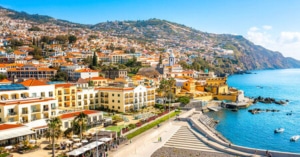
Top 10 Overseas Destinations for Remote Workers in 2025
Digital Nomad Visas create opportunities to live abroad while working remotely. Our guidance helps you explore the best destinations in 2025 for lifestyle, affordability, and
Imagine a place where the Atlantic Ocean cradles a lush, volcanic island blending the rugged cliffs of California’s Pacific Coast, the tropical vibrancy of Hawaii, and the quaint charm of a Portuguese village. Madeira, a Portuguese gem 300 miles off North Africa’s coast, defies description with its dramatic mountains, misty laurel forests, and crystalline shores. As a travel writer, I’ve explored 36 European countries, yet Madeira’s beauty, its banana plantations, ancient churches, and Funchal’s cobblestone streets, left me speechless. International Property Alerts shares why this island is a timeless haven for expats and travellers. This island of 105,000 residents offers retirees and expats an affordable, safe, and serene lifestyle, rivaling pricier destinations like Hawaii or St. Lucia. But with United Airlines’ new nonstop flights from Newark, Madeira’s secret is out, and its untouched allure may soon change. Here’s why this “Hawaii of Europe” is a must-see before the crowds arrive.

Picture this: the Atlantic’s azure expanse dotted with red-tiled villages, cascading waterfalls, and mountains soaring 6,000 feet, shrouded in clouds. Add terraced banana fields reminiscent of Asian rice paddies, jungle ravines echoing Costa Rica, and clear waters rivaling Greece’s Ionian Sea. Stir in Funchal, a charming capital with 16th-century chapels, fado music, and Michelin-starred dining, and you’ve got Madeira, a compact (35 by 14 miles) paradise that feels like a portal to a wilder, simpler era. Its mild climate (55-85°F), affordable living (30-50% less than U.S. coastal cities), and English-friendly services make it a magnet for American expats fleeing political divides, brutal winters, and processed diets.

Rob and Patti Hoffman, both in their late 50s, left Ann Arbor, Michigan, in August 2024 for Canhas, a village 40 minutes west of Funchal. Their three-bedroom, two-bath apartment with four patios, perched 1,250 feet above the Atlantic, costs €1,400 ($1,500) monthly, an unthinkable deal in the U.S. “Michigan’s winters were brutal, and the food culture was junk,” Rob says over a pastel de nata at a Canhas café. Frustrated by America’s polarized politics, Rob, a former journalist fluent in French, reclaimed Portuguese citizenship via the Sephardic “Law of Return.” Patti, managing multiple sclerosis, is pursuing a family reunification visa. Their healthcare premium, covering her condition, is €280 ($300)/month, versus $500 in Michigan. “We’re healthier, walking everywhere, eating fresh produce, playing walking soccer,” Rob says, gesturing to banana groves below.
Kathy and Jim Vandelaare, from Detroit, chose Funchal’s heart for a 1,025-sq-ft, three-bedroom apartment with mountain views, also €1,400 ($1,500)/month. After losing their son to fentanyl poisoning and savings in the 2007-08 crash, they sought safety and affordability. “In the U.S., our savings would last eight years; here, the rest of our lives,” Jim says at a seafood patio near their English-mass church. Kathy’s “out-of-body” visit in 2023 sealed their decision, Madeira’s mild weather trumped the Algarve’s heat and Porto’s rain. They’ve joined expat groups like Madeira Friends and Madeira Foodies, connecting with Americans, Brits, and South Africans. “It’s safer and prettier than any U.S. suburb,” Kathy says.

Funchal, a visual feast of whitewashed buildings and jacaranda-lined streets, blends Old World charm with modern amenities: malls, hypermarkets, hospitals, and restaurants like William (Michelin-starred). Unlike Lisbon’s gritty edges, Funchal’s Old Town is pristine, with pedestrian lanes alive with fado music and seafood tavernas. A 15-minute cable car to Monte reveals lush gorges and Atlantic vistas, best seen early to dodge crowds. Beyond Funchal, Madeira’s landscapes stun. I drove 14 miles from Calheta’s 75°F beach to Fanal Forest’s 46°F fog, a UNESCO-protected laurel grove evoking a mystical Scooby-Doo set. In Porto Moniz, volcanic pools shimmer, perfect for a stay at Aqua Natura Bay Studios or a meal at Pedra Mole’s mountainside patio (grilled meats for two, €25/$27).
Madeira’s roads tunnel through mountains and cliffside highways, demanding a rental car (€30/day) to capture its beauty: black-sand beaches, waterfalls, and ravines that prompt constant “Wow!” moments. Learn more in our country guide in Portugal. The island’s size means Porto Moniz to Funchal takes under an hour, though photo stops stretch it. Prices surprised me, groceries at Pingo Doce match or beat Lisbon’s, gas is cheaper, and a two-bedroom apartment with parking and views rents for €1,500 ($1,620). Compared to Hawaii’s $3,000/month rentals or St. Lucia’s import-driven costs, Madeira is a bargain.
A couple can live comfortably on €2,500-€3,500 ($2,700-$3,780)/month, including rent (€800-€1,500), groceries (€200), and dining (€150). Healthcare is affordable; private insurance (€50-€300/month) supplements Portugal’s public system, with specialist visits at €40 ($43). The Non-Habitual Resident (NHR) visa offers tax breaks for 10 years, requiring €2,000/month ($2,160) income, while the D7 visa (similar income) suits retirees. EU citizens settle easily; non-EU Americans need income proof and health insurance, processed in 3-6 months. English is common in Funchal, but basic Portuguese helps in rural areas. Public transport (buses, €2-€5) connects towns, but cars are essential for exploring. For those considering a move, exploring real estate in Portugal offers many affordable opportunities.
Winters are mild (55-75°F), summers breezy (mid-80s), and rain is brief, mostly in mountains. Healthcare facilities in Funchal rival mainland Portugal’s, with English-speaking doctors. Challenges include slow online shopping (Amazon UK, €15-€30 shipping) and Funchal’s airport (45 minutes away), though United’s Newark-Funchal flights (June-September, 6.5 hours) ease U.S. travel.
Socially, expat groups and markets like Mercado dos Lavradores foster community, while festivals (Madeira Wine Festival, Flower Festival) add vibrancy.
Madeira’s beauty, its forests, cliffs, and villages feels fragile. Rob worries, “If too many discover it, it’ll change.” Social media and new flights are boosting tourism, risking over-crowding like Santorini’s. Yet, sharing Madeira feels inevitable; its beaches, voted Europe’s best, and landscapes demand to be seen. My advice: visit now, rent a car, and explore before the secret spreads. Tell friends it’s “ugly” to keep it pristine, but you’ll want to shout its beauty from Fanal’s misty peaks. For guidance on relocating, feel free to contact us.
Madeira offers tropical beauty, mild weather (55-85°F), and 30-50% lower costs than U.S. coastal cities or Hawaii. English-friendly, safe, and close to Europe, it’s ideal for retirees and expats.
A couple can live on €2,500-€3,500 ($2,700-$3,780)/month, including rent (€800-€1,500), groceries (€200), and dining (€150). A two-bedroom apartment costs €200,000 ($216,000), half Hawaii’s prices.
The D7 visa (€2,000/month income) or Non-Habitual Resident (NHR) visa (tax benefits, similar income) suit retirees. Non-EU citizens need income proof and insurance; EU citizens settle easily.
Yes in Funchal’s shops, restaurants, and hospitals; less so in rural areas. Basic Portuguese helps, but expat groups like Madeira Friends ease integration with English events.
Excellent, with Funchal’s hospitals and English-speaking doctors. Private insurance (€50-€300/month) covers specialists (€40/visit); public healthcare is accessible after residency.
Mild winters (55-75°F), breezy summers (mid-80s), with mountain rain. Perfect for hiking Fanal Forest or swimming in Porto Moniz’s volcanic pools year-round.
Limited unless remote work or tourism-related (e.g., teaching English). Most rely on pensions, investments, or digital nomad income due to language and permit barriers.
Buses (€2-€5) connect Funchal to towns, but cars (€30/day rental) are vital for rural exploration. Funchal’s airport (45 minutes) links to Lisbon or Newark (seasonal, 6.5 hours).
Vibrant, with expat groups (Madeira Foodies, Girls Gone International) hosting hikes, dinners, and festivals (Wine Festival, Flower Festival). Markets and cafés foster local connections.
Fanal Forest (UNESCO), Porto Moniz volcanic pools, Funchal’s Old Town, cable car to Monte, and cliffside drives. Day trips to black-sand beaches or waterfalls are breathtaking.
About International Property Alerts
International Property Alerts is a premier global platform connecting real estate investors with handpicked opportunities in emerging and lifestyle-driven markets. Through curated listings, expert guidance, and market insights, we help buyers make confident property decisions worldwide.
Media Contact:

Phone: +44 7961 212181

Digital Nomad Visas create opportunities to live abroad while working remotely. Our guidance helps you explore the best destinations in 2025 for lifestyle, affordability, and

Discover Paphos, Cyprus, where expats embrace affordable living, vibrant culture, and a warm Mediterranean lifestyle surrounded by history, beaches, and a welcoming community that feels

Dubai Islands is the city’s newest mega waterfront project—five islands with luxury villas, 80+ resorts, marinas, and lifestyle hubs. With property prices still far below
Compare listings
ComparePlease enter your username or email address. You will receive a link to create a new password via email.